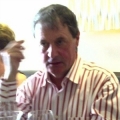You have no items in your cart. Want to get some nice things?
Go shopping A plethora of short fiction, essays, poetry, and reviews have appeared in various print and on-line journals. I appeared in several anthologies. Theatre and radio also feature in the oeuvre. Impressive, they say. Well, hard work too. Nothing came easily. It was always a challenge to discover what I wanted to say. Perhaps I was saying too much, scattered here and there, a corpus in need of some coherence, a binding of ideas and images between hard covers.
A plethora of short fiction, essays, poetry, and reviews have appeared in various print and on-line journals. I appeared in several anthologies. Theatre and radio also feature in the oeuvre. Impressive, they say. Well, hard work too. Nothing came easily. It was always a challenge to discover what I wanted to say. Perhaps I was saying too much, scattered here and there, a corpus in need of some coherence, a binding of ideas and images between hard covers.
How about a novel? I had longed to be a novelist way back. But that never happened. ‘Publishable without having any commercial value,’ had been the frank judgement. Fiction publishing is not given much subsidy. It has to take its chance in the philistine free market. The literary novel must look for a way in round the back of the property. Occasional possibilities may be stumbled on. I stumbled on Black Wolf, an enterprising publisher far from the metropolitan commercial milieu. From Fife came an offer to publish a novel. With no interest in a vanity project, I was surprised to find so easily someone prepared to take a chance on my first book as sole author.
That may not make me a novelist. I would need more than one on the shelves before I could be other than a writer whose output includes a novel. That suits me because a writer explores all the avenues available. My concern is that I marshal my resources in a serious direction and not dissipate my energies on too many opinion pieces. Everything I write I try to write well. But I must write with a creative purpose also.
Before the manuscript was acceptable or accepted it had to be trimmed of excess. There was too much discussion of the deeper meaning of things, and too many digressions. The actual length of the completed project was more that of a novella. It is a length that suits me, but it is difficult to persuade publishers to take shorter work, as if quantity was a guarantee of quality.
In my case the intensity with which the narrative of Heaven’s Invention is written is more suited to a shorter form than the full-length novel. There is a nervous edge to the narrative tone, a thread of anxiety that surprises me when I re-read it, for it was not written quickly.
The first version was begun years something like twenty years before it was published. It was completely rewritten subsequently. Part of it was diverted into a separate and complete short story, which was published, that became the basis of a play, The Night City. The novel was also transformed into a play, which I felt unsuitable for performance. And so I rewrote it again. This was the fourth version.
By this time Heaven’s Invention had changed considerably, although it was even then not ready for publication. Time passed, and much else was written. I wondered if the novel had a future. The answer was yes but only after severe cutting. Thousands of words I had laboured over had to be discarded because they read so laboriously. What was left was brief, taut and much more interesting:
‘There is no marriage in heaven, but there is love.’ I had the title of my novel before I read those words from a poem by Edgar Lee Masters. The quotation served as the epigraph of Heaven’s Invention. And what has heaven invented? The answer is love.
My novel is set on earth where love is often confused with desire. But the themes of the narrative and their possible meanings came a long way behind the images I had in mind. The first image was of a house on a steep cliff above a park. My recollection was of an actual location in Bath. Hedgemead Park [renamed Paradise Park in the novel] rises up the hill quite gently. In false memory I was thinking of Beechen Cliff which really is steep. The two locations at opposite ends of the city merged into my imagined place.
Orhan Pamuk has spoken of the novel as a vantage point. He compares the novel to the Chinese landscape painters who would climb a mountain before depicting the landscape. Only the naïve would think the painting was actually executed on the mountain peak.
It felt real, as it had to if the fiction was to have any life. I saw the garden of the house overlooking the park. It was very early morning. Someone has climbed up the cliff, and is wandering in the garden. I knew so much about the intruder: he was young, intelligent and charismatic. He was one of the ‘Paradise People’ camping as a protest in the park. The intruder – he soon had the name Simpson – was more focussed than the directionless dropouts in the park. He was looking for an opening into a new life.
With a promising beginning I had a thread of narrative to follow. I made the decision to write it in the first person. I was watching Simpson in the garden. I was going to speak to him. The narrator was going to be me, but not me. The novel is not autobiographical, although it is deeply personal. It is a reflection of a time and place I have known. Most of the characters are imagined. The events are entirely imagined. Yet the narrative emerges from a reality, or realities, I have known or witnessed.
I could pretend it was a dream.
That opening sentence was a late addition, a necessary one because it acts as the key to the narrative which is a bad dream presented as reality. Simpson is a strangely compelling figure who, young as he is, knows how to manipulate people to his advantage. He reads their weaknesses. That is his strength. It is the strength of a destroyer.
Simpson is not based on any one person, but is an amalgam of several people I have had the misfortune of knowing at different times of my life. Of course without such misfortunes I would not have the experience to understand people, nor the material to write fiction. I do not recommend the seeking out of experience good or ill. Such experience surely will come to you.
I always have seen myself a something of an observer. I have often felt at some distance from the scenes of which I was part. Irony is a necessary component in a writer’s armoury. A part of you is rewriting the scene even as you watch it. And yet I have not written from direct personal experience in Heaven’s Invention.
There are various short memoir-pieces published during the long gestation of the novel. There is no correlation between them and my novel except that I lived in the city of the novel, Bath, where I studied. And I continued to live in or near Bath for some time. There is a memoir of my student time, and another of my time in street theatre, community journalism and my first attempts at writing.
You may ask why I chose to set a story of corruption in a beautiful city? I have asked myself this. I think the answer is more than one answer. I know the location, but have gained some distance from it. The way Bath has become, thanks to the tourist industry, something of a Jane Austen theme park is an irritation especially when you remember that Jane Austen did not like Bath, and that this is a city with a long history. That history includes ordinary people leading ordinary lives. One summer I took a vacation job at the large engineering works. There I began to put the city into perspective.
The reality of a city of actual people is the basis of the novel. Those people included a prominent businessman involved in a financial scandal. I never even saw this man, but I read reports of his incautious ambition and subsequent downfall. He was not morally corrupt in the way Dave Marsh in my novel is. Marsh is intended to be representative of the greed and stupidity which has overtaken the world. Bath is one corner of that world, but it is not an oasis of beautiful purity in a wicked world. Its Palladian beauty is undeniable, but elegant stone does not guarantee moral worth of those with in its walls. Bad things can happen anywhere.
The mysterious and sinister country club Marsh runs is entirely imagined. It serves as the physical location of the corruption that the narrator witnesses. When a young woman, apparently a prostitute, is found murdered an investigation takes place. What is uncovered is a political conspiracy. If this sounds a little fanciful it is well to remember that there were conspiracies of some seriousness against the Labour government in the Seventies. I could pretend it was a fantasy, but I think it very possible that a future government committed to social change that challenges wealth and power could face similar attempts at subversion.
This awareness may account for the undertone of anxiety which gives the narrative its edge:
I could pretend it was a dream.
Spiders move with the light. They are confused by shadows. If they move at night it is when light can guide them. Perhaps a candle burns, or there is a moon, or the streetlamps are bright. Spiders are very sensitive to sound. They hear much that they cannot see. The world of the spider does not resemble our world. They hardly know us except as the vague, menacing presence that unaccountably breaks their delicate webs and their fragile lives.
The hope is that this opening is sufficiently intriguing that the reader is drawn into the web. It is dark outside, the narrator tell us. The implication is that it is dark within.
Heaven’s Invention is published by Black Wolf Edition

About Geoffrey Heptonstall
Geoffrey Heptonstall is a poetry reviewer with The London Magazine. Recent creative work includes poetry for Dead Ink, The English Chicago Review, International Literary Quarterly, London Grip, Message in a Bottle, The Passionate Transitory, The Recusant and three anthologies, Connection, In on the Tide and Underground. There is recent fiction for Open Wide, Vintage Script and Writers’ Hub. New essays for Cerise Press and New Linear Perspectives are published this year. Geoffrey’s recent theatre writing includes a play, Providence, published in The Lampeter Review.




One comment